Alumni stories
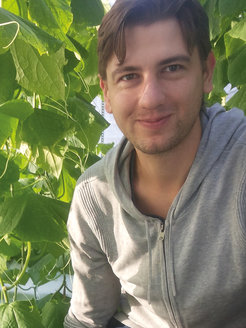
Stefan Karlowsky (as of September 2019)
After my thesis defense in December 2018, I started a new position as PostDoc at the Leibniz Institute of Vegetable and Ornamental Crops (IGZ) in Großbeeren near Berlin. In my current project, I study nitrous oxide emissions from hydroponic vegetable cultivation, and how these greenhouse gas emissions can be reduced by adjusting various growth conditions. My new work builds on previous experiences from my PhD time at MPI-BGC, as it also focusses on the interaction of plant and microbial processes. Albeit it is a quite a change from grassland ecology to greenhouse vegetable production, I find it exciting to get to know recent horticultural practices and to learn further research methods. Anyhow, I am glad to make use of the broad knowledge of carbon and nitrogen cycling that I got by visiting the IMPRS courses and by exchanging with other IMPRS/MPI-BGC people. Thanks a lot for the nice time!
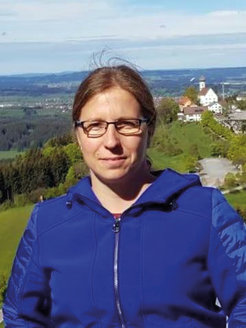
Sabrina Arnold (as of August 2019)
After completing my PhD project dealing with total column measurements of carbon dioxide, methane and carbon monoxide in the atmosphere, I recently started a position as a scientist at the German Meteorological Service (Deutscher Wetterdienst, DWD).
The position is within the project “Integrated Carbon Observation System” (ICOS) which is a European research infrastructure. More than 130 measurement sites spread in twelve member countries of ICOS form a dense European network of in situ greenhouse gas measurements. Regarding the atmospheric measurements within the network, the DWD is responsible for setting up the nine German stations belonging to the network. As my PhD project also dealt with measurements being performed in a network (that time it was the Total Carbon Column Observation Network, TCCON), many things I experience in my current job are familiar to me. Two examples are the common measurement setup every group of the network has to have or the very standardized data analyses to make sure the data are comparable across all sites.
My primary tasks are to monitor the performance of the measurement systems, to ensure the data quality and to analyze the data. Similar to my work at the MPI-BGC communicating our work to the public is also part of my current job. Because my job is still in science I can make use of a lot of skills I acquired during my PhD such as programming, handling large data stets, performing statistical analyzes as well as creating scientific posters, giving talks and scientific writing.
One thing I really like about my new job is that I am still very much related to the greenhouse gas community. During meetings and conferences I often meet people who also have completed a PhD or work/have worked at the MPI-BGC. It is awesome that I can learn new methods and get to know new folks while at the same time I still work with some familiar faces and feel connected to former colleagues.
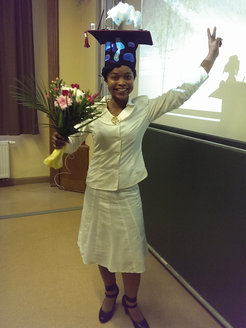
Lailah Gifty Akita (as of June 2019)
The past scientific training coupled with experience paves the path for the present endeavour.
Lailah is a postdoctoral research fellow (since June 2016) working on “biological monitoring of coastal water quality in Ghana” under Volkswagen Foundation, Junior Fellowship Grant (89371), affiliated to Department of Marine and Fisheries Sciences, University of Ghana.
PhD is part of a journey to self–discovery, a transition from a student to a scholar. The possibility of PhD adventure lies in enthusiastic interest for further career development, a given privilege for personal and professional advancement, an assurance of a scholarship such as Max Planck Fellowship and necessary academic support.
The inter-disciplinary PhD project, structured PhD soft skills programmes and research stay abroad, provided the best completeness of an excellent graduate training. The course structure such as biogeochemical cycle, palaeoclimate, soil biology and climate policy provided broader perspectives for a better understanding of natural science. Soft skills like time management, academic writing, how to finish your PhD and rules of good scientific practices contributed to my progress in the PhD endeavour. Regular project meeting (every six months) with supervisors, progress report writing and PhD research abroad, effectively stimulated encouragement, improvements and sure steps for completing the PhD. Other side-events including PhD retreats, public outreach, reading club and Thursday Thirst, provided friendly atmosphere for discussion, inspirations and exchange of ideas.
My journey of PhD is characterized with ups and downs, high and lows, darkness and lights, depression and happiness and among many. “I am grateful for all my victories, But I am especially grateful for my losses. Because they only made me work harder.” Mohammed Ali. It is very demanding but with diligence determination, coupled with supportive enthusiastic supervision, the PhD candidate is able to successful complete the journey of becoming a doctorate with critical thinking capabilities. Problem solving skills in an enduring endeavour is the hallmark of PhD training. “…. Do not quit. Suffer now and live the rest of your live as a champion.” - Mohammad Ali
The holistic training unearth my potential in development of scientific skills necessary for being a Natural Scientist with specialization in palaeo-ecology. Furthermore, team-working spirit within inter-disciplinary research in international environment was an excellent exposure. It lays the foundation for becoming an independent researcher, Ghana-German research collaborations and continuous international networking.
I only understood worth of the training after a successful completion, how it paves the pathway to fully enjoy the present and hopefully embrace the future opportunities with enduring spirit.
Only your goals in life will keep you going.
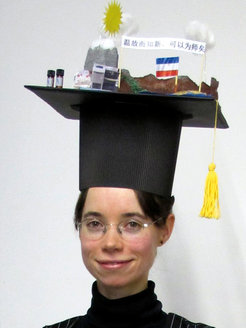
Franziska Günther (as of February 2019)
I am working as scientific coordinator at the University of Duisburg-Essen being responsible for the Collaborative Research Centre / Transregio 247 (CRC/TRR 247) “Heterogeneous Oxidation Catalysis in the Liquid Phase” funded by the DFG. My tasks include planning and organisation of meetings and conferences, finances, legal contracts and proceedings, human resources, public relations as well as reporting and funding proposals. In addition, I am also coordinating the integrated graduate school UnOCat “Understanding Oxidation Catalysis” in CRC/TRR 247. Therefore, my own experiences in the IMPRS-gBGC are a big advantage. In general, my work as a scientific coordinator is very diverse requiring a broad understand of the (natural) science system that I gained during my PhD and Post-Doc time at the MPI-BGC. The comprehensive education and my foreign research visit in the Netherlands in the framework of the IMPRS-gBGC also provided me with a very good basis for further exchange with scientists from different disciplines, countries and generations. I love this variety and new challenges I am facing every day to provide the best framework conditions for our scientists and their research.
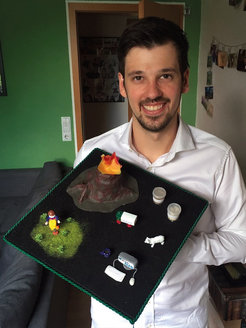
Thomas Lange (as of November 2018)
I started my PhD project on 1st January in 2015 at the department of Geosciences at the Friedrich Schiller University Jena under the supervision of Prof. Dr. Georg Büchel. Shortly after and on his recommendation, I joined the IMPRS-gBGC as an associated member. I think that getting into a doctorate is very difficult for many people because a project that runs over several years requires a clear structure and time management already in the very beginning. At first, especially during the preparation of the PAC meetings, I spent a lot of time and critically asked myself whether the time was well spent on the extensive literature review and the data collection. However, the discussions with my committee and also with other members of the IMPRS helped me to develop a clear structure and the research questions of my project. The courses I participated also took me forward, although I have to admit that these were not always useful for geoscienists with a focus on geology and geophysics. Before I joined the IMPRS-gBGC, I was very sceptical owing to the fact that my research focus was not on global biogeochemical cycles. Nowadays, I think that participating in retreats and courses as well as giving talks and presenting posters helped me to improve my English skills, to act more confidently and above all to make new contacts. I am very grateful that my PhD supervisor encouraged me to take this step, even though I initially resisted it. I decided very early that I would like to try my luck outside academia. Just before my PhD defense on the 4th of July 2018, I received a commitment from the Deutsche Bahn AG in Leipzig where I applied for a position in contaminated sites and waste management. I joined the company on the 1st of August 2018. In the job interview much emphasis was put on the orientation of my PhD project. They looked for somebody who is familiar with geophysical methods and has a geological education. I made a confident appearance which I had acquired and improved during my doctorate.
Now I am working as a planner for weaponry (I know that sounds crazy). Railway facilities were always a tactical target of Allied attacks during the Second World War. Even today unexploded bombs from these times regularly appear during construction work in the track area or at railway stations. Even before construction works geophysical reconnaissance measurements must be carried out to grant a weaponry release. Depending on the planned measures my task is to weigh which geophysical methods can be used. The geological underground situation and the anthropogenic use of the environment always play an essential role. In addition to this activity, I am also involved in the development of soil recycling concepts where it is mainly about the reuse of building materials and excavated material but also the disposal of these depending on the contamination classification. I would not have thought that I would work for the Deutsche Bahn AG but the company includes a variety of subcontractors in a variety field of works. Especially in the management of contaminated sites and waste management some PhD students are employed.
Overall, I am convinced that by means of a doctorate and additionally as a member of a renowned graduate school you not only increase your chances of finding a good position within research but also in the private sector.
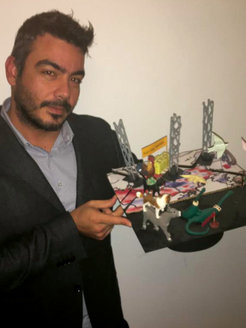
Panagiotis Kountouris (as of October 2018)
Drift & Noise assists companies and organisations involved in the development of economic activities in ice-covered waters, whose common main concern is the risk of harm to health, safety and environment.
With its sea ice management products and services Drift & Noise offers important risk management tools based on scientific expertise and supported by a time-tested consulting methodology.
I am a physisist with a MSc in meteorology and environmental physics and a PhD in atmospheric inverse modelling. Currently I am working as a remote sensing software engineer. Everyday tasks include but are not limited to development of satellite image processing algorithms, operational ice maps and administration of our server infrastructure. Research and development is also part of the work. I am working with meteorological modeled data and imagery from sattelites using Synthetic Aperture Radar, optical and infrared data, to develop higher level products to assist Vessels travelling to polar waters. This position requires both technical as well as soft skills. Scientific programming, visualization methods, geospatial libraries like gdal, hands on experience with meterological data formats, and version control software are only some of the tools which I learned during the PhD and the IMPRS courses, and they proved to be really important. On everyday basis we do face smaller or bigger chalenges, where an analytical way of thinking and processing, while dividing problems into smaller tasks is required for better comprehension. And this is something that it can be developed during a PhD work. Time management, tasks prioritarization and project reports are of great importance too, and skills that a PhD student can gain a real hands on experience. But don't forget, PhD and the research school provide the tools. It is up to us how to use them effectively and extract all the knowledge we need for a succesfull after PhD life ...
Stefan Hanf (as of October 2018)
I graduated successfully in the year 2015 within the IMPRS-BGC scholarship at the MPI for BGC and finished my PhD in the group of Prof. Popp at the IPHT in Jena. Since more than 3 years I’m working as a project manager and R&D engineer at Laser components in Munich. I’m part of a small engineer team focusing research and development primary on cross-disciplinary direction with high personal expertise on fiber optics technologies for customer driven solutions (e.g. custom OEM projects). My scientific PhD background and realized IMPRS courses in self- and time-management, leadership skills, scientific writing and communication skills generally help in organizing and managing my projects, supervising students (B.Sc., M.Sc.) within projects or writing proposals for funded industrial projects in collaboration with different universities and business partners.
My theoretical work on fiber laser optics during my PhD and applied practice in joint project with the MPI-BGC laid the foundation for practical work within an international company, e.g. accomplishing an entire customer request-driven product development process.
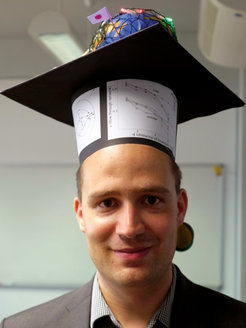
Jakob Fischer (as of September 2018)
I'm working as a Software Engineer in a medium sized german software company. We are developing specialized software that allows train and bus companies to plan their vehicles and personnel. Many of the technical skills needed are either computer science basics or learnt on the job. I guess my PhD mainly prepared me for non technical parts of my current job. Giving presentations, managing time resources, dealing with different kind of bosses and bureaucracy as well as handling projects that overrun their schedule or change focus.
Similar to research, in a company there are different roles with different interests that have to achieve a common goal. A big part of my company's business happens in German, but I still think that my foreign research stay and experience in interdisciplinary research helps me a lot in dealing with social and political aspects of office life. Being trained in scientific writing also makes writing technical documentation easier.
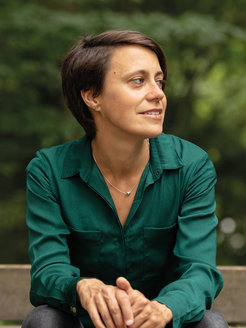
Juliane Geller (as of September 2018)
I'm currently working at the well-known Baumwollspinnerei (well known at least amongst artists ;P) in Leipzig-Plagwitz for DocYet, a quiet recent start-up. I'm working part-time, as I'm also employed as a Yoga teacher, while completing an advanced teachers training at Yoga Vidya, Leipzig. At DocYet, I'm creating an artificial intelligence to improve a chat bot, which will help the user with his medical questions. A quite challenging and at the same time fullfilling job in a very creative and international environment. Though I'm not making use of the very content of my thesis, the statistical knowledge I gained still helps me to get into neural networks pretty quickly. Further, I don't struggle with the fact that I'm pretty much left on my own in eciding how to fullfill my tasks, as the thesis trained me to work inpendent. And I'm sure that the soft skill workshops offered by the IMPRS will help me further along when presenting our app to the world :)'
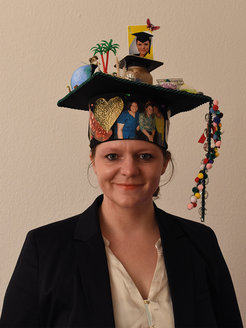
Aileen Meier (as of September 2018)
I am working for an international environmental Consulting Company. We mainly investigate polluted sites and brownfields, comprising the organisation of soil as well as groundwater explorations and remediation. We supervise the work in field, we evaluate the results within a Report and give suggestions for further investigations. Accordingly, we have a frequent contact to the environmental agency.
Additionally, I am working as Key Account Manager for one of our main customers. With having this position I am the direct contact Person for my colleagues and the customer and enforce the customers requirements. It is of advantage to have a doctoral degree, especially to increase Promotion prospects due to its representative character.
The microbiological topic I worked on at the IMPRS helps me in projects of natural attentuation as non-technical method for remediation. Furthermore, the soft Skills I got during my PhD such as time management, scientific writing and giving talks support my work.
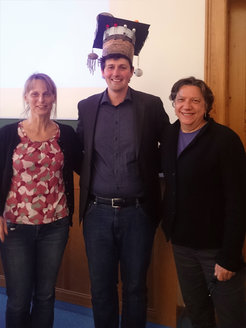
Martin Nowak (as of June 2018)
I was a PhD student at the MPI-BGC from 2013 to 2017. After finishing my PhD about microbial CO2 fixation in soils and groundwater, I got a job at the Bavarian Environment Agency, a governmental administrative agency in the city of Hof, which is actually not very far from Jena.
My primary task here is to work on geological maps from the Frankonian Alb, a prominent Karst area in South-East Germany within the EU-funded project “Bodenatlas Bayern”. These maps are provided as a web-GIS application to the public, the “UmweltAtlas Bayern”. By this way a broad range of environmental data related to geology, soil, geohazards and hydrology is provided to the public.
I do also work on small scientific projects, like developing chemostratigraphic tools, i.e. stable isotope methods, to classify Upper Jurassic carbonate rocks as well as application of predictive analytics to identify areas which are prone to geohazards like landslides, a very common feature in my working area.
I got this job simply by sending an application and the best way to learn about vacant positions in administration agencies is the “Jobbörse” from the “Agentur für Arbeit”. If you register there, you can get also support for applications within Germany. The main reason why I got the job was also not necessarily because of my PhD, but rather because of my background as geologist from my master studies. However, I think a PhD is definitely an advantage, also in administrative organizations, because of the skills you learn during your research. I wish you all the best for your science projects and studies!









